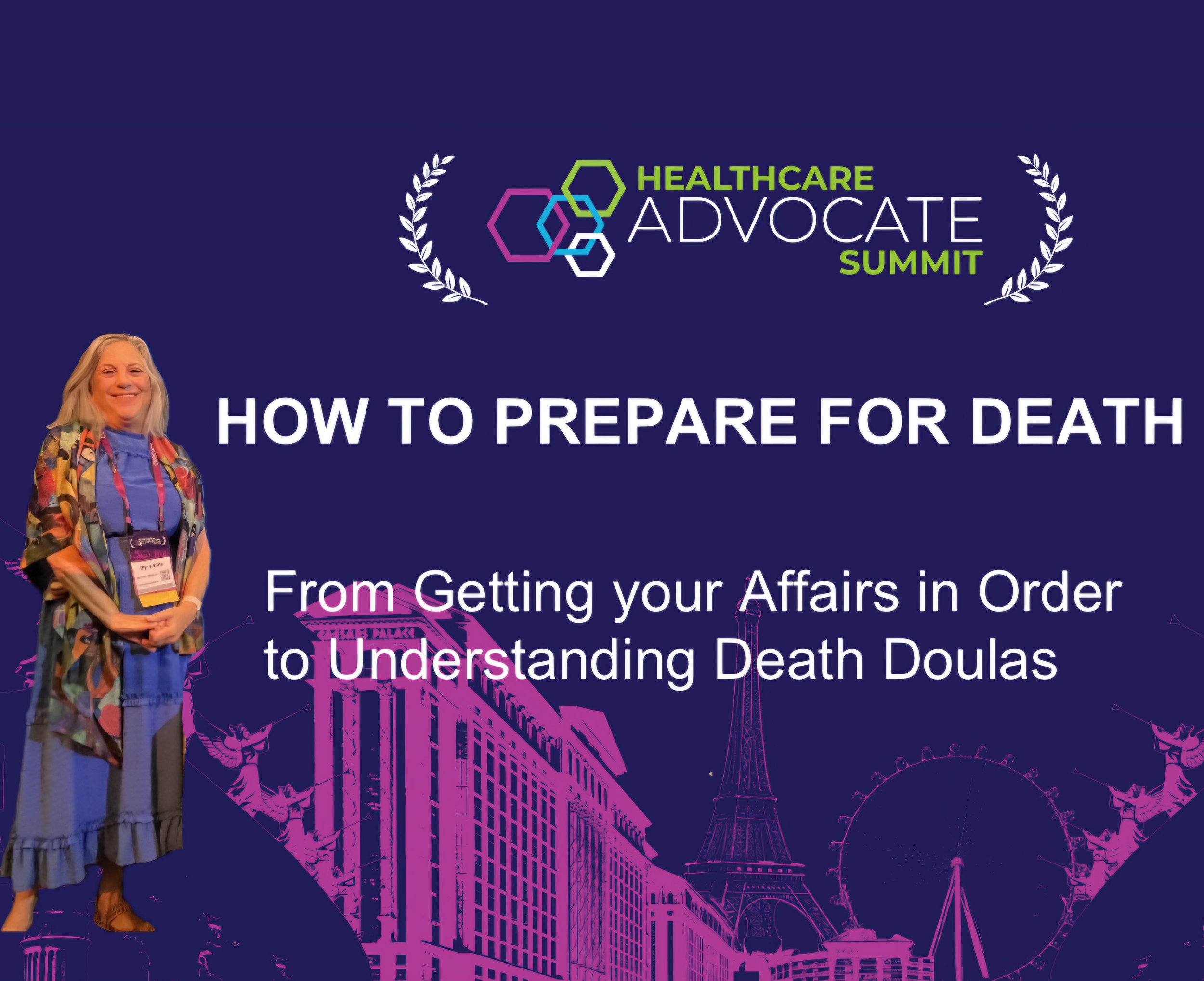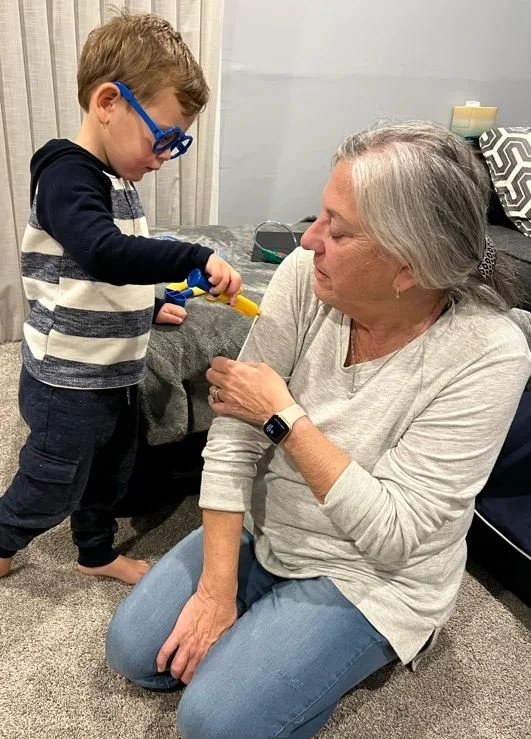How to Prepare for Death
Death. A word we shudder to say or think about. On the other hand, birth is at the opposite end of the spectrum, a time of joy, hope, and excitement. And while they conjure up very different emotions, we need to think about death and plan for it. We are all going to die someday, and we need to think about it, plan for it, and bring our loved ones and friends into the conversation because, whether we want it or not, it will happen. And everyone will be much better off if plans are discussed. We plan and discuss birth; let's do it with death and not be afraid to say the word.
The most important "lesson" is having a conversation with your loved ones and having Advance Directives (these only come into play IF you are unable to make a decision for yourself). Think of it as an insurance policy, which will be referred to only if you cannot make decisions at the time. Suppose you don't have an Advance Directive and don't have a spouse or children. In that case, the hospital will assign someone to decide for you. If you want to make decisions concerning your health in a crisis, such as if you want to be on a ventilator or have a feeding tube, get them done. You also will need a health care proxy and a POLST or MOLST. These are forms within each state that are vital; if an EMT is called to your residence and you are not breathing, they legally have to do everything to keep you alive, even if you have a DNR tattoo plastered to your chest!
Also, redo your wills and other forms annually and with every health change or move. Recently, I met with a family member and their 90-year-old mother, who they thought was in good shape. She had a MOLST (Maryland Orders for Life-Sustaining Treatment) form; HOWEVER, it was dated in 2016! Her health has changed, and the MOLST order was folded into 8ths in her wallet! Nobody would ever find it.
Recently, I had the amazing opportunity to speak at a Patient Care Conference for Health Care Advocates about death and the importance of preparation.
Read More
Decisions: Life After Retirement
My husband and I live in a lovely, comfortable house where we raised our two sons. It is a rancher, and with the exception of having the washer and dryer downstairs, it is pretty much a perfect home to age in place. We have a large, private backyard, and we enjoy being outside watching the birds (and the deer outside the fence). We could probably stay here indefinitely; however, we are not near our family. But otherwise, life is good here.
We have one son, daughter-in-law, and grandchildren in Long Island; another son lives in Philadelphia. After 36 + years in Baltimore, we made the difficult decision to move to New Jersey, in between our sons so that we could see them more often.
What a difficult, bittersweet decision, but the right one. My husband and I figured it would take two years to downsize. While we thought about it in April, we are moving in 8 weeks! All the stars aligned, and we are moving to a 55 and older community. We found the "right" place, our offer was accepted and we sold our house right away. No looking back.
This is not an easy decision for anyone, especially us, having been in Baltimore for so many years (my husband's hometown). I know where to buy my fresh fish and the best fruit, get my hair cut, and we have all of our doctors.
Read More
The Reality of Dealing with Death
As a Physician Assistant working with cancer patients, sometimes at the brink of death or dealing with metastatic cancer, I would make it my business to be logical, without too much emotion. It is always easier to be that way, but it never lasted because I would put myself in their place (both the patient and their loved ones) and return to reality.
I learned to use the words “cancer, death, died, do not resuscitate, pound on the chest” as easily as the words “happy, sunshine, coffee.” Because I had to; while working there I didn’t sleep well for years and fondly remember so many of my patients.
Now, to another type of reality. An old, old friend (the platinum kind, not in age) is dealing with metastatic cancer. She lives out of state, and there are times when I want to hug her and tell her all will be okay and times when I want to shake her, you need to” get it.”
Read More
Saying Good-Bye Isn't Easy
As I sit here with Ms. X in her hospice room as her death doula, I think about how difficult it is to die. She is unusual because she has been here for more than two weeks. In fact, this is my third visit. When I first came 13 days ago, she was semi-conscious, occasionally crying out, but mostly comfortable. I watched her aide lovingly bathe her, covering her private parts and moisturizing her skin. Lastly, she plucked the little white hairs on her chin so she would look beautiful as she prepared to die.
When I visited last week, she was still with us but had slipped into a coma. I was sure she was able to hear me. Studies have shown that hearing is one of the last senses to go. I talked about the balloons in her room, the cards from her family members, and how much they love her. But it is nearly impossible for them to be here all the time. She is here in a beautiful facility, cared for by nurses, nursing aides, doctors, and death doulas.
Read More
Advocacy at its' Best: Prevent, Don't Sue
I recently had a telephone call from a fellow Physician Assistant who looked at my resume and saw that I had worked for a lawyer as an investigator, determining when medical standards were breached and if there was potential to sue the doctor (or hospital.)
As I listened to her, it took me back to many years ago when I believed that I could change the system, that if there were “bad” doctors out there who made life-changing mistakes, not only would the patient be compensated, but the doctors would no longer be able to practice.
I quickly learned that in Maryland, at least, it doesn’t matter. I had one doctor who was found guilty of malpractice four times and was still practicing when he missed a lacerated liver on an 18-year-old child who died.
As I was listening to this woman speak to me about what happened to her mother, I realized that trying to stop the doctors was a long and arduous task. Instead, we must work to prevent these incidences. We need to advocate for ourselves, our loved ones, our clients. Why wait until the mistakes happen?
No amount of money will make up for a dead child or a parent who had been independent, now living in assisted living, unable to toilet themselves.
Read More
Need a Medical Procedure in June or July?
This is a blog from last year, but it is important enough to review it annually (like we review our Advance Directives) as it is one constant in the health care system.
If we talk with our friends and tell them of an impending elective surgery or medical procedure, often we are met with, "Don't go in July. The new "doctors" are there, and they don't know anything." And June isn't much better, as the fellows typically have one foot out the door, and some people often complain that the care is lacking. Is it true? Are we more vulnerable at the end of June and in July, when many of our doctors went from Mr., Ms. Mrs. to "Dr. Smith" overnight? It may be, but it reminds us of the need to continue to do our due diligence and not assume that things will "flow" perfectly" and there will be no glitches in our care. So, how do we do that?
Read More
Death Doula
I am a volunteer Death Doula for my local hospice. What is a Death Doula? I assist patients and their loved ones as they are near passing away. It is a very humbling experience and makes the family feel better. I believe people can still hear as they get ready to die, and I try to comfort them and let them know they are not alone.
Usually, I am a Death Doula at the facility, and patients at this point no longer receive anything by mouth, food, or water, but they are very comfortable, and nature takes its course. Today, I am at a nursing home, and I am both sad and appalled. The patient is an 83- year-old who had a stroke, and I was told: “actively dying.” However, she is still getting fluids by IV, being fed through a feeding tube, and presently is breathing at 52 breaths a minute! The average person takes approximately 15 breaths a minute. This woman is using every bit of strength to breathe. It’s exhausting! And this is where morphine has a role. It helps with pain and controls breathing.
And Medicare continues to pay. Why? Did anyone discuss her prognosis with the family? Do they understand that she is struggling to breathe? Did she have an Advance Directive? I don’t know if she is a full code, meaning, if (when) her heart stops, will they administer CPR?
We need to prepare for death as we prepare for childbirth, and my being here today
Read More
Dementia-- The Impact of a Diagnosis
Dementia-what is it? We hear this word thrown around lately by anti-Biden people, anti-Trump people, the media, and people in general. And it is not a term to use lightly, yet I see it more and more daily. The National Institute on Aging states, "Dementia is the loss of cognitive functioning—thinking, remembering, and reasoning—to such an extent that it interferes with a person's daily life and activities." The Oxford Dictionary defines it as "a condition characterized by progressive or persistent loss of intellectual functioning, especially with impairment of memory and abstract thinking, and often with personality change, resulting from organic disease of the brain."
There are many variants of Dementia (but for now, we will focus on two). The most common is Alzheimer's, which is typically progressive. When I hear the word, I picture a shriveled-up little old lady sitting in a corner languishing, waiting for the day when she doesn't wake up again. The other common form of Dementia is due to vascular changes, i.e., mini-strokes, each one slowly killing off a piece of the brain, making it more challenging to function, live alone, and perform ADLs (activities of daily living), and the progression can be slower. One day, a loved one may notice that mom or dad isn't the same. They get lost when driving, forget to turn off the burner or take their meds, have a short-term memory that isn't good, and may exhibit personality changes. They may be short-tempered and get angry when they are challenged about remembering something that you KNOW you told them ten times. But it would be best not to get angry because they know something is changing and are often frustrated and scared.
A physician typically makes the diagnosis after possibly talking with loved ones who are concerned, verifying it with a neurologist or geriatrician, gathering medical history, and perhaps performing a MoCA cognition test. It is a quick test used to accurately access short-term memory,
Read More
6 Years as an Advocate
Six years ago, I left my job as a Physician Assistant in Oncology and Hematology and took the plunge: I became a Board Certified Patient Advocate. I had been interested in advocacy for quite some time, and, working in oncology, I readily advocated for my patients and their loved ones. There are so many different ways that advocates can help, and I decided my niche would be working with those newly diagnosed with cancer and helping them navigate the healthcare system without the use of Dr. Google and well-meaning friends.
Over time, it has morphed, and while I am still working with cancer patients, I am working more with people with impending death and their loved ones, as well as people with chronic, often terminal diseases. We work on their Advance Directives, which are so vital. Many people do these along with their wills with their attorneys, yet if you ask most attorneys, unless they are elder care attorneys, they don't "do a great job." To do a thorough job with advanced directives means explaining and understanding all of the moving pieces, and it can take hours to have an Advanced Directive where everyone is "happy." As a PA, I have stood over too many bedsides with loved ones arguing
Read More
A Healthcare Quandry
I find myself in no man’s land this weekend, and I am not alone. Two days ago, I was “under the weather,” had a low-grade fever and cough, and was just exhausted. I have had all my shots, but we just returned from a trip to the mountains with the grandkids (and their parents), gone to restaurants, and figured it may be time to give up my banner as “Covid Unscathed.” I took a test, it was negative, and I went to bed. My fever inched itself up towards 102 and stayed there. (I am of the belief that you treat the symptoms, not the fever). The next day, it was the same thing but worse: more coughing, fatigue, and a fever. Oh, and when I swallow, it feels like a knife sticking in my throat. But, what to do? I took another Covid test and it was negative again. Go to the ER where I will be exposed to more illness, and I am not an emergency. So I will sit for hours, and feel guilty because people are really there and deserve to go ahead of me. Go to a free-standing health center, whereby I can at least get tested for flu and strep and be sure I don’t have pneumonia. But despite the fact that insurance does pay, it is ridiculously expensive. Or ride it out in the comfort of my home.
Read More











